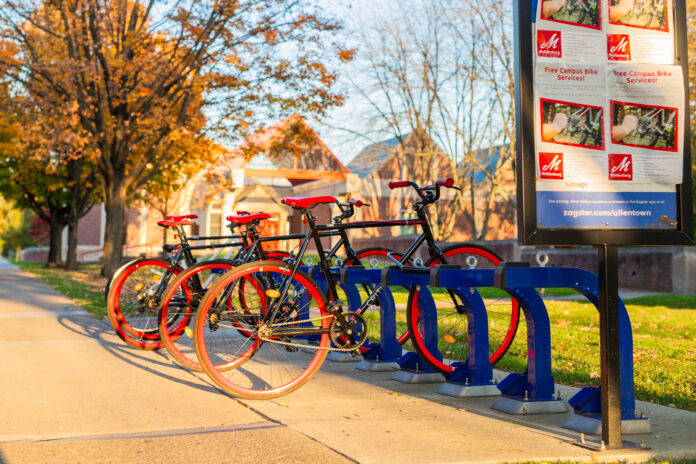Muhlenberg’s recent sustainability initiatives, like the discounts for using reusable cups or the addition of the serpentine garden, are continuing through the launch of the Bike Share Program. A collaboration between the Office of Sustainability, Trexler Library, Campus Safety and the Student Government Association, the program’s goal is to expand Muhlenberg’s interdepartmental commitment to community, as well as to have a viable environmental impact. The official grand opening of the program was celebrated with food and entertainment on the front lawn outside Trexler Library on Oct. 20 with faculty of the Office of Sustainability present to answer questions and provide general information to students in attendance. Just an hour after the event began, students began to borrow bikes.
This is not Muhlenberg’s first attempt at a bike share program. The first bike share program was launched in 2016, but the program was run through a third party company, Zagster, that ultimately went bankrupt during the pandemic. Now, the bikes from that program are being reused. The partnership with Trexler Library is intended to expand the repertoire of student services that the library already offers. “The bikes make sense,” Nicholas Cunningham ‘17, public service & student engagement librarian, says. “I think it’s very much Trexler trying to meet the student body where they are, and especially if there is that need for a bike share program, then absolutely we are more than happy to help out with that.”
This collaboration between departments makes the process of borrowing a bicycle as easy as taking out a book: go to Trexler’s front desk, request a bike and as long as there is one available, all you have to do is swipe your student ID and sign a waiver, and you will receive a helmet and key to a bike lock. All of the available bikes are kept outside the front entrance of Trexler on a bike rack with U-locks. The deadline for returning a bike is midnight the following night, and the penalties for failing to return the bike, or anything associated with the bike like the helmet or lock, follows the same guidelines as overdue library books. There is a $2 fee for every day the bike is not returned, and every part of the bike is designated a specific price that must be paid if the bike is not returned 72 hours after its deadline. Returning your bike means returning your key and helmet to the front desk and locking the bike back into the Trexler rack. If you happen to be accident-prone or simply anxious about cost, Campus Safety is here to reassure you that there are no fees for taking out a bike or repairs, with very few exceptions. All repairs and tune-ups are under Campus Safety’s jurisdiction, and include such services as tube and tire replacements, brake repairs and derailleur adjustments.
The partnership between disciplines and departments offers a dual purpose to the program. Ashley Henry ‘26, the project manager, believes that “the new Bike Share Program will have more longevity and promote a more sustainable Muhlenberg,” primarily because of its internal operation. Additionally, the Bike Share Program is tapping into campus sustainability efforts. Campus Sustainability Specialist Natalie Sobrinski says that Muhlenberg’s environmental initiatives “requires that we implement initiatives that promote social justice and environmental stewardship. The Bike Share Program strongly supports the campus sustainability community because it enhances transportation equity and reduces our environmental impact.”
With Muhleneberg being such a contained campus, bikes aren’t a strictly necessary service. However, the popularity of scooters and skateboards suggests that they aren’t unwelcome. Taylor Current ‘27 shares that, “I personally won’t be using the bike program, but I think it’s a really great idea that a lot of students will benefit from.” Allentown’s hills also make the city a difficult terrain to bike on, but some see it as an athletic challenge. Jordyn Brown ‘27 says that, “I think I would start using the biking program on days where I have spare time and want to get in some exercise.”
As Project Manager, Henry also says that future hopes for the program include working with the city. “The Office of Sustainability is currently looking into creating a bicycle route map for the Allentown area in collaboration with the city that will highlight safe routes for members of the Muhlenberg College community to bike to commonly visited locations such as grocery stores and parks.” For questions and feedback, contact bikeshare@muhlenberg.edu.






















